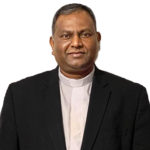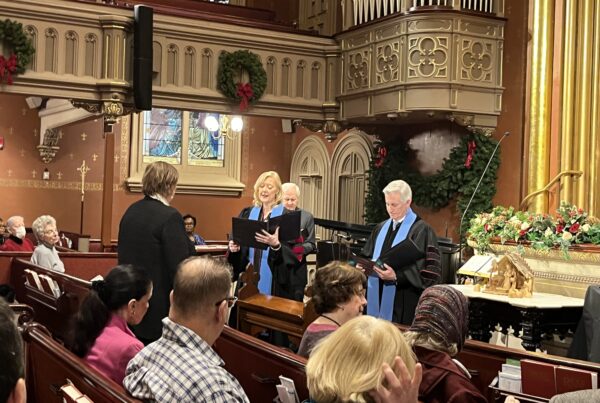Jebasingh Jebamony was dedicated for the ministry at a young age. After a crucial turning point and years of biblical study, he is now answering God’s call to plant a multi-ethnic church in Chicago, Illinois. This personal calling story is part of a series on purposeful living.
I believe that my call to plant a multi-ethnic church had its roots in God’s plan. As Paul says in Romans 8:30, “And those he predestined, he also called; those he called, he also justified; those he justified, he also glorified.” Surely God took me through the process of his promises and guided me through his plan, beginning even before my birth.
I was born to Hindu parents, Mr. K. Jebamony and Mrs. Gnana Chellammal. Mr. Joseph, who was the Secretary of the Church of South India, had adopted my mother and raised her up. When she got married, he told her, “Your firstborn will be a male child, and I want you to dedicate him for the ministry.” Accordingly, I was born and my mother dedicated me for the ministry. My father became a convert from Hinduism; he said, “I was once a Hindu priest in my village. Now, let my son become a Christian priest.” With this dedication of both my parents, I grew up with Christian disciplines and values.
However, though I grew up in a Christian environment, I was superficial in my faith life. But the shameful experience of failing the final exam in 12th grade English caused a change. After failing the exam, I went into my room and cried before God. During this personal encounter with God, I read Jeremiah 1:5: “Before I formed you in the womb I knew you, and before you were born I consecrated you; I appointed you a prophet to the nations.” As I realized God’s love and God’s purpose for my life, I wept and confessed my sins before him and asked forgiveness. I experienced a true peace and joy in my heart after the prayer. I surrendered my life to Jesus and obeyed his call for the ministry. This was the turning point in my life.
As I obeyed God’s call into full-time ministry, I began to get involved in church activities such as Sunday school, youth meetings, preaching the gospel, church planting, Campus Crusades, assisting in the pastoral ministry, and other church administrative works. The motivation to be involved in God’s mission and in the ministries of the church came to me as a result of God’s love that I found throughout Scripture. I did this work with an attitude of gratitude for God’s love. Also, these basic ecclesiastical values and workings laid a strong foundation to equip myself in the Word of God.
With the bond of my commitment to Christ and in submission to his call, my focus was on preaching and teaching the Word of God. The quest for knowledge of the Scriptures was first instilled in me by the Sunday school teachers. They helped me to memorize the Bible verses and to seek God’s grace and wisdom. Your local Sunday school can be really helpful in educating kids about Christ and His teachings and you may discover more here about the tools and software to help make kids enjoy their Sunday school experience.
I later enrolled at Union Biblical Seminary for the bachelor of divinity to educate myself in the knowledge of Scripture. My initial approach to the Scriptures was from “context to text” rather than from “text to the context.” But prominent contextual theologies soon quickened my thinking and became my theological persuasion. In addition, the prophetic concerns of justice and mission to the poor and marginalized sharpened my identity with such people of the community. I understood God as liberator and the gospel as the power of salvation.
My investigation into Scripture got deeper when I pursued a master of theology (Old Testament focus) at Gurugul Lutheran Theological College and Research Institute. With the help of historical critical methods and the contextual methodologies, I was oriented to critique the text and explore “what is behind the text, what is in the text, and what is in front of the text?” I began to read the Bible as a faith document rather than merely as a historical document. The various contemporary theologies, such as feminist theology, eco-theology, contextual theology, and liberation theology, became great tools to carryout the gospel as a liberative power. These approaches helped me to read the Bible and relate to the context effectively.
My most recent education—a doctorate of theology from the Senate of Serampore University—helped me to search Scripture for daily living. The quest for knowledge of Scripture remains in me unending. My aim of higher studies is to preach and teach the Word of God in ways that are biblically relevant and contextually appropriate.
I believe all of this study of Scripture and understanding its application to context is part of God’s plan for me. The Scripture verse I read when I turned my life over to Christ and his calling—“…I appointed you a prophet to the nations” (Jeremiah 1:5)—is coming true in my life. After ministering to people in multiple language groups in almost every state in India, God has brought me to the United States. I now have the opportunity to plant a church, Multi Ethnic Church of Mount Greenwood, that lives out what we read in Revelation 7:9: “a great multitude … from every nation, from all tribes and peoples and languages, standing before the throne and before the Lamb.” I am called to be a blessing to the people of all nations present with us. Together, we find a faith and spirituality fulfilled in Jesus Christ, who has guided me throughout my whole life. To this call, I commit myself.

Rev. Dr. Jebasingh Jebamony
Jebasingh Jebamony is currently involved in planting Multi Ethnic Church of Mount Greenwood in Chicago, Illinois, with the Reformed Church in America. He earned his doctorate from the Senate of Serampore University and engaged in his post-doctoral research in the field of interfaith and intercultural studies. He has a deep experience of both teaching and preaching the Word of God being relevant to the context, and he is committed to cross-cultural mission work. He is blessed with the support of his wife, Prabha, and their two children, Annes Jebasingh and Jeyson Paul Jebasingh.



